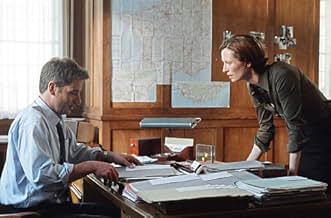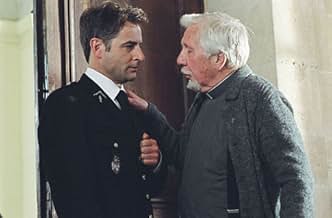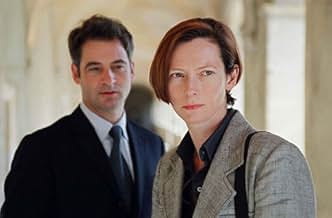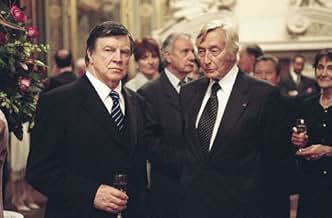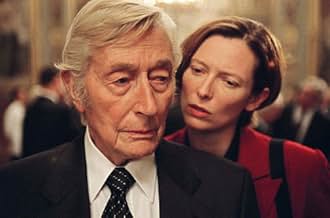NOTE IMDb
6,2/10
5,7 k
MA NOTE
L'histoire d'un ancien bourreau nazi devenu la cible des tueurs à gages et des enquêteurs de la police.L'histoire d'un ancien bourreau nazi devenu la cible des tueurs à gages et des enquêteurs de la police.L'histoire d'un ancien bourreau nazi devenu la cible des tueurs à gages et des enquêteurs de la police.
- Réalisation
- Scénario
- Casting principal
- Récompenses
- 4 victoires au total
David de Keyser
- Dom André
- (as David De Keyser)
Avis à la une
After France fell to Germany in 1940 , the Vichy regime was set up under Marshal Petain . In 1943 , the Vichy government created a military force called Milice to carry out the Nazi occupiers . When the war was over many of those involved were prosecuted for war crimes . Some get away . A few rose to power . Pierre Brossard ( Michael Caine ) committed crimes against humanity and collaborated with Nazis in WWII . Today Pierre follows hidden by priests of Catholic Church that sheltered him during fifty years and is being protected by a strange sect called The Chevaliers of St. Marie . But a judge ( Tilda Swinton ) and a colonel ( Jeremy Northam ) are investigating his past . Meanwhile , a mysterious murderous ( Matt Craven) is pursuing Pierre to kill him .
This TV movie produced by Canadian television in association with BBC packs suspense , mystery , thrills , action and is quite entertaining . Jewison cast some largely known actors as Michael Caine , his wife well played by Charlote Rampling , the starring duo as Tilda Swinton and Jeremy Northam , and a remarkable support cast as Ciaran Hinds as Inspector Pochon , Alan Bates as Bertier , Frank Finlay as the Comissaire and several others . Atmospheric musical score by Norman Corbeil and appropriate cinematography by Kevin Jewison , director's son . The motion picture is professionally produced and directed by Norman Jewison . He is a prestigious and veteran filmmaker, his greatest film is of course Jesus Christ Superstar . He considers The Hurricane (1999) the last in a trilogy of racial bigotry movies he's realized, the first two being In the Heat of the Night (1967) and A Soldier's Story (1984).
The film terminates with an epilogue based on real events , that says the following : ¨At 5:00 am , on June 29, 1944, in Rilleux -La-Pape, France, seven Jews were executed ¨. The movie is dedicated to those seven men and the 77.000 other French Jews who perished under German occupation and the Vichy regime .
This TV movie produced by Canadian television in association with BBC packs suspense , mystery , thrills , action and is quite entertaining . Jewison cast some largely known actors as Michael Caine , his wife well played by Charlote Rampling , the starring duo as Tilda Swinton and Jeremy Northam , and a remarkable support cast as Ciaran Hinds as Inspector Pochon , Alan Bates as Bertier , Frank Finlay as the Comissaire and several others . Atmospheric musical score by Norman Corbeil and appropriate cinematography by Kevin Jewison , director's son . The motion picture is professionally produced and directed by Norman Jewison . He is a prestigious and veteran filmmaker, his greatest film is of course Jesus Christ Superstar . He considers The Hurricane (1999) the last in a trilogy of racial bigotry movies he's realized, the first two being In the Heat of the Night (1967) and A Soldier's Story (1984).
The film terminates with an epilogue based on real events , that says the following : ¨At 5:00 am , on June 29, 1944, in Rilleux -La-Pape, France, seven Jews were executed ¨. The movie is dedicated to those seven men and the 77.000 other French Jews who perished under German occupation and the Vichy regime .
I rated this film a 7/10 - with some mixed feelings, because in many ways it was a downbeat film without any kind of neat "message" that would make me feel "a better person" for having seen it. But on second thought I realized that the finished film rather neatly reflects the moral complexity of Brian Moore's novel which it is based upon - and which Ronald Harwood's screenplay follows remarkably closely.
Brian Moore is one of my favorite late 20th century authors, whose work has provided the basis for several other memorable films, most notably "Black Robe." He writes in a Graham Greene-esque mode, his characters often anguished or guilty Catholics or ex-Catholics who struggle to live morally in a degraded and corrupt world. Moore himself appears to have known much about divided loyalties and twentieth century alienation. Although identified as a Canadian author, Moore was born in Ulster - and actually lived most of his later life in California and the South of France. He was clearly fascinated by questions of faith, of good and evil - and he boldly tackled these themes in "The Statement."
In France in the late 1980s and early 1990s there were several prominent cases of Vichy-era collaborators who were belatedly brought to justice by the French court system. Moore was clearly fascinated by the way in which leading members of the French governmental and bureaucratic system continued to hide unpleasant truths about their own pasts - and by the role of the Catholic Church in France in providing refuge and assistance to some individuals who had been involved in the persecution and round-up of Jews.
Michael Caine deserves a great deal of credit for taking on the role of a reprehensible character who nonetheless retains his full humanity. There's never any question in the film about his guilt - he clearly took part in the brutal murder of Jews during wartime. (He's also quite mean to dogs.) And yet he is not without a sympathetic side. It's clear that he's manipulative, but it's also easy to see why many intelligent and devout people of faith would be willing to assist him in his attempt to live "underground" hiding from justice. Caine isn't a caricatured film villain - not like Ralph Fiennes in "Schindler's List" or John Malkovich in "Ripley's Game." But in a real sense, it's all the more disturbing that he seems like "just another innocuous old man."
It was disappointing to me to see that fine performers Jeremy Northam and Tilda Swinton with so little to do in the film - other than looking bewildered as Caine's character continues to elude their grasp. On the other hand, it is quite enjoyable to watch their flirtatious glances with one another. There were many nice touches in the film showing the pleasures of French life - gourmet business lunches, for example, and the beautiful scenery of Provence. Even the supposedly seedy cafes look like they belong in a tourist brochure.
Brian Moore is one of my favorite late 20th century authors, whose work has provided the basis for several other memorable films, most notably "Black Robe." He writes in a Graham Greene-esque mode, his characters often anguished or guilty Catholics or ex-Catholics who struggle to live morally in a degraded and corrupt world. Moore himself appears to have known much about divided loyalties and twentieth century alienation. Although identified as a Canadian author, Moore was born in Ulster - and actually lived most of his later life in California and the South of France. He was clearly fascinated by questions of faith, of good and evil - and he boldly tackled these themes in "The Statement."
In France in the late 1980s and early 1990s there were several prominent cases of Vichy-era collaborators who were belatedly brought to justice by the French court system. Moore was clearly fascinated by the way in which leading members of the French governmental and bureaucratic system continued to hide unpleasant truths about their own pasts - and by the role of the Catholic Church in France in providing refuge and assistance to some individuals who had been involved in the persecution and round-up of Jews.
Michael Caine deserves a great deal of credit for taking on the role of a reprehensible character who nonetheless retains his full humanity. There's never any question in the film about his guilt - he clearly took part in the brutal murder of Jews during wartime. (He's also quite mean to dogs.) And yet he is not without a sympathetic side. It's clear that he's manipulative, but it's also easy to see why many intelligent and devout people of faith would be willing to assist him in his attempt to live "underground" hiding from justice. Caine isn't a caricatured film villain - not like Ralph Fiennes in "Schindler's List" or John Malkovich in "Ripley's Game." But in a real sense, it's all the more disturbing that he seems like "just another innocuous old man."
It was disappointing to me to see that fine performers Jeremy Northam and Tilda Swinton with so little to do in the film - other than looking bewildered as Caine's character continues to elude their grasp. On the other hand, it is quite enjoyable to watch their flirtatious glances with one another. There were many nice touches in the film showing the pleasures of French life - gourmet business lunches, for example, and the beautiful scenery of Provence. Even the supposedly seedy cafes look like they belong in a tourist brochure.
What I have to say is first a repetition of what most of the users have already pointed out:Michael Caine is an exceptional actor;even when the character is a b..... ,he almost makes us side with him.A collaborator in occupied France during WW2,he was responsible for the death of seven Jews and he was never punished for what he had done.Pierre Brossard puts his trust in God,and he's always praying Saint-Christopher and begging absolution from his crimes.Outside Caine,best performance comes from Charlotte Rampling ,who,as always,makes the best of an underwritten part.
But the screenplay is a novel transferred to the screen ,and it's a NOVEL.There are as many holes in the plot as in Swiss cheese.The judge (a woman of course)and the military man are cardboard characters (but we are spared the love affair between them,just for that,M.Jewison,thank you!!!),and actually we could easily do without them.One of the judge's uncles is a minister/secretary,no less! It's true that fundamentalist Christians have a tendency to support the far right.But making so many abbeys of the South of France a shelter for people like Brossard ,demands such an imagination...It seems that every priest, every monk and every nun of my country are here to protect those who killed the Jews !One often forgets that there are many of them who helped and saved children during those darker days of French history.
I have not read the book but I do not feel like doing it.A movie was made in the eighties about Beate Klarsfeld (TV).People complained because they chose Farah Fawcett to portray her ,but at least it was based on accurate historical facts (Klaus Barbie).
But the screenplay is a novel transferred to the screen ,and it's a NOVEL.There are as many holes in the plot as in Swiss cheese.The judge (a woman of course)and the military man are cardboard characters (but we are spared the love affair between them,just for that,M.Jewison,thank you!!!),and actually we could easily do without them.One of the judge's uncles is a minister/secretary,no less! It's true that fundamentalist Christians have a tendency to support the far right.But making so many abbeys of the South of France a shelter for people like Brossard ,demands such an imagination...It seems that every priest, every monk and every nun of my country are here to protect those who killed the Jews !One often forgets that there are many of them who helped and saved children during those darker days of French history.
I have not read the book but I do not feel like doing it.A movie was made in the eighties about Beate Klarsfeld (TV).People complained because they chose Farah Fawcett to portray her ,but at least it was based on accurate historical facts (Klaus Barbie).
In looking through the other comments here and listening to responses as I left the theater after watching 'The Statement,' I've noticed a lot of criticism about the use of English actors using English accents in a movie set in France.
I won't venture to discuss the merit of this choice, but I wanted to point out, in case anyone is that interested, that this is an old stage tradition. The same thing came up when 'Enemy at the Gates' came out, where English actors played Russian characters without affecting Russian accents. It's not uncommon to assign, across the board, English actors/accents to the linguistic majority of a production. I don't know if this stems from the historical preeminence of the London stage or because English accents are thought to be less problematic for American audiences or what, but I do know that this is something that happens quite often and originated in live theatre.
I won't venture to discuss the merit of this choice, but I wanted to point out, in case anyone is that interested, that this is an old stage tradition. The same thing came up when 'Enemy at the Gates' came out, where English actors played Russian characters without affecting Russian accents. It's not uncommon to assign, across the board, English actors/accents to the linguistic majority of a production. I don't know if this stems from the historical preeminence of the London stage or because English accents are thought to be less problematic for American audiences or what, but I do know that this is something that happens quite often and originated in live theatre.
After the Nazi's were driven out of France, those who had collaborated were mostly rounded up and punished many by death. However some escaped and were hidden, while others rose in power within the new regime. Pierre Brossard is one of the former and continues to live in fear, protected from those that would avenge his victims by his friends within the Catholic Church. However a close encounter shows that some group is closing in on him, meanwhile political pressure from Judge Livi and Colonel Roux's investigation into his whereabouts mean that he is quickly running out of friends willing to shelter him.
It is difficult to know how to approach this film because it itself doesn't seem too sure of what it is trying to do. Is it a drama looking at the idea of fleeing war criminals? Is it a chase movie? Is it a character piece looking at Brossard? It is never clear because it does do some elements of each but it doesn't really do anything that well and I, as a viewer, was a bit confused about what I was supposed to feel or think during it. The story itself is OK, reasonably engaging but not having anything of interest to it. As a chase film I was interested and the themes helped it seem more than the sum of its parts but not in reality. The motivations of the characters are never that well developed; the Livi/Roux parts are dull and quite routine although the sections with Brossard are more interesting.
It is a shame then that the film cannot decide what it wants to do with him do we feel for him, hate him or just watch him? The film doesn't let us decide this in a good way representing the complex nature of the character, but rather just doesn't push out any ideas one way or another. Caine does well despite this and gives a good character a bit of depth. He is where the film is although he probably benefits from the fact that everyone else is quite ordinary. Swinton and Northam are quite ordinary and their parts of the film just seem put of place and half-cooked. Support from Neville, Bates, Rampling and others just about do the job but add little.
Overall this is an OK film but nothing at all more than that. Despite the interesting and complex potential the film just delivers an ordinary chase movie and fails to do anything with the ideas and concepts inherent in it. Caine does well to produce quite a convincing character but he is alone in that, with the material and the rest of the cast failing to do anything that interesting. Not bad but not worth trying to find because it is nowhere near as good as one would have hoped.
It is difficult to know how to approach this film because it itself doesn't seem too sure of what it is trying to do. Is it a drama looking at the idea of fleeing war criminals? Is it a chase movie? Is it a character piece looking at Brossard? It is never clear because it does do some elements of each but it doesn't really do anything that well and I, as a viewer, was a bit confused about what I was supposed to feel or think during it. The story itself is OK, reasonably engaging but not having anything of interest to it. As a chase film I was interested and the themes helped it seem more than the sum of its parts but not in reality. The motivations of the characters are never that well developed; the Livi/Roux parts are dull and quite routine although the sections with Brossard are more interesting.
It is a shame then that the film cannot decide what it wants to do with him do we feel for him, hate him or just watch him? The film doesn't let us decide this in a good way representing the complex nature of the character, but rather just doesn't push out any ideas one way or another. Caine does well despite this and gives a good character a bit of depth. He is where the film is although he probably benefits from the fact that everyone else is quite ordinary. Swinton and Northam are quite ordinary and their parts of the film just seem put of place and half-cooked. Support from Neville, Bates, Rampling and others just about do the job but add little.
Overall this is an OK film but nothing at all more than that. Despite the interesting and complex potential the film just delivers an ordinary chase movie and fails to do anything with the ideas and concepts inherent in it. Caine does well to produce quite a convincing character but he is alone in that, with the material and the rest of the cast failing to do anything that interesting. Not bad but not worth trying to find because it is nowhere near as good as one would have hoped.
Le saviez-vous
- AnecdotesAs of April 2019, this is producer and director Norman Jewison's last movie.
- GaffesWhen Brossard searches the killer's wallet, we can see 500 francs banknotes with the head of Pierre and Marie Curie. This kind of banknote was released in 1994 and the action takes place in April 1992.
- Citations
Pierre Brossard: Pray that we meet again... in this world.
- ConnexionsFeatures Only You (1994)
- Bandes originalesLe Chemin des Forains
Music by Henri Sauguet
Lyrics by Jean Dréjac
Performed by Baguette Quartette
Published by G. Schirmer Inc., administered by Music Sales Corporation
Courtesy of Baguette Quartette
Meilleurs choix
Connectez-vous pour évaluer et suivre la liste de favoris afin de recevoir des recommandations personnalisées
- How long is The Statement?Alimenté par Alexa
Détails
- Date de sortie
- Pays d’origine
- Site officiel
- Langues
- Aussi connu sous le nom de
- The Statement
- Lieux de tournage
- Sociétés de production
- Voir plus de crédits d'entreprise sur IMDbPro
Box-office
- Budget
- 27 000 000 $US (estimé)
- Montant brut aux États-Unis et au Canada
- 765 637 $US
- Week-end de sortie aux États-Unis et au Canada
- 37 220 $US
- 14 déc. 2003
- Montant brut mondial
- 1 079 822 $US
- Durée1 heure 54 minutes
- Couleur
- Mixage
- Rapport de forme
- 1.85 : 1
Contribuer à cette page
Suggérer une modification ou ajouter du contenu manquant

Lacune principale
By what name was Crimes contre l'humanité (2003) officially released in India in English?
Répondre


